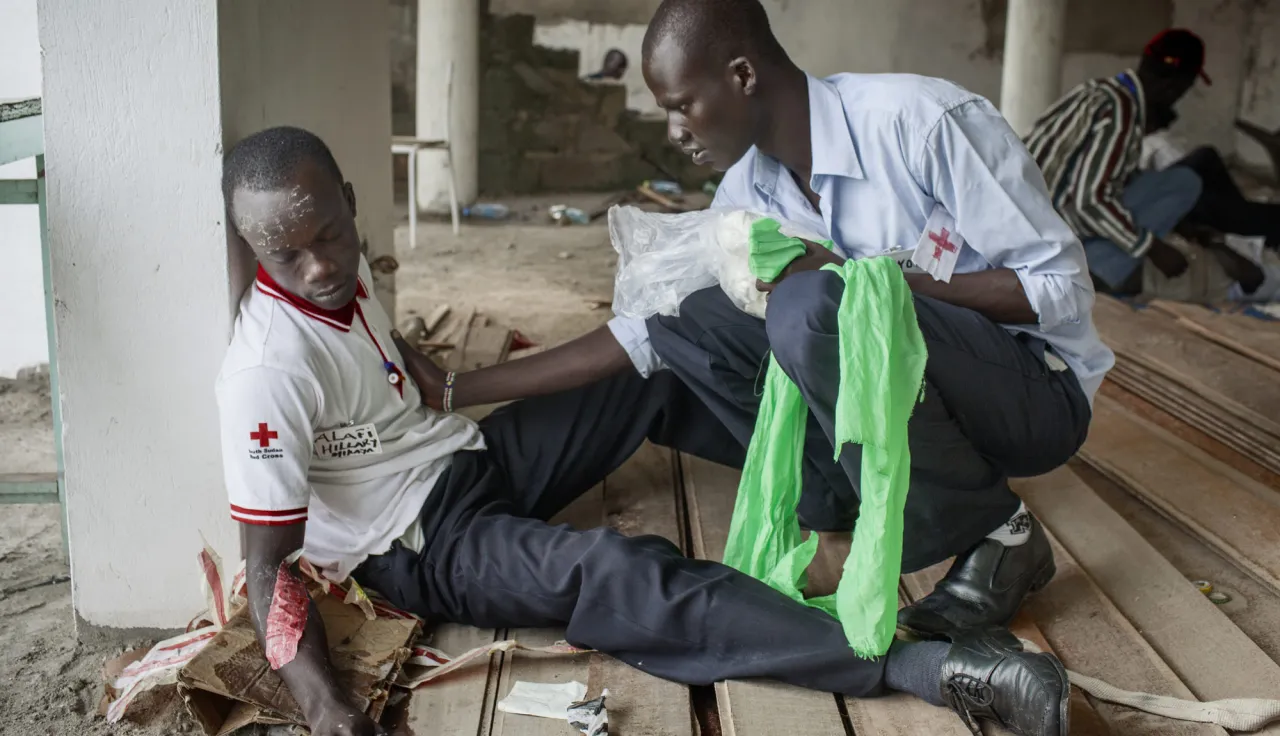Health Care in Danger: We still need to do a lot of advocacy

Since December 2013, when the conflict began, the South Sudan Red Cross (SSRC), the ICRC, the International Federation of Red Cross and Red Crescent Societies and other Movement partners have been working hard to provide relief to hundreds of thousands of people in dire need. To make matters worse, in May 2014, there was an outbreak of cholera. We asked Veronica Kenyi, SSRC health manager, to tell us how her National Society was dealing with this exceedingly difficult situation.
|
How is the violence in South Sudan affecting the delivery of health care? Health facilities are being looted and burnt down, and medical equipment and supplies stolen; staff and patients are denied access to health-care facilities; and deliveries of medicines are often blocked. Many health-care workers are afraid to come to work. The result of all this is that patients suffer even more. |
|
With regard to delivering health care, what are the main challenges confronting Red Cross workers and volunteers?
The poor security conditions, to begin with. That is a major problem. Weapon bearers often know nothing about the rights of health-care personnel, that they are protected by law, for instance. During crises, weapon bearers target, and even occupy, health facilities. Since health-care workers are fleeing their posts, the Ministry of Health has to depend on first-aid volunteers. You can imagine how this affects the quality of the health care provided. Bad roads and limited means of transport make it even more difficult for people to get access to health care. Ethnic tensions are a major obstacle as well: sometimes, the ethnic identity of volunteers is a more important consideration than the fact that they are health-care providers.
How are Red Cross health-care workers and volunteers dealing with the cholera outbreak?
First, we realized that there were difficulties in coordination and information sharing among the various humanitarian organizations involved with the national task force, particularly the flow of information to and from the states affected. So we decided to create a Movement task force chaired by the SSRC. We also had to find a way to protect staff and volunteers who were helping to transport cholera patients from the oral rehydration points in emergency vehicles; the risk to their health was extremely serious because the equipment was not sanitized. We solved this problem by ensuring that the vehicles were disinfected after use.
What measures have you taken so far to ensure that health care can be delivered in safety? And what will you be doing next?
I can give you a few examples: to ensure that we learn from our experiences and improve our services, if there is an incident, the SSRC staff or volunteer involved must fill in an incident report form. Afterwards, we might, depending on the incident, have a meeting with the communities to clarify the role and status of the SSRC. For instance, during the ongoing conflict, when SSRC volunteers were attacked by internally displaced persons (IDPs), we had a meeting with IDP community leaders to ensure that they understood the importance of respecting health-care workers. We are also thinking of merging the ICRC and SSRC incident reporting forms to make sure that key HCiD security aspects are taken into account whenever an incident occurs. We are aware that South Sudan is a very particular context where still more needs to be done. Given our extensive volunteer network, at the SSRC we can do more to raise awareness of HCiD among communities. We are developing an HCiD project and adding HCiD training in areas where SSRC volunteers are already training health-care workers to be part of community health programmes. Our next step will be to organize meetings with the relevant authorities to ensure safe access to health care for everyone.
What must be done to increase protection for health-care workers and facilities, medical vehicles, and patients?
I think that we still need to do a lot of advocacy and dissemination locally and internationally. Volunteers must ensure that communities understand their own role in protecting their health units and health–care workers; this is crucial. It is just as important that health-care personnel be fully aware of their role and their responsibilities. And we also need to involve the authorities, as well as weapon bearers, more than at present. At the international level, cooperation with all the parties concerned must be strengthened, and training institutions should include aspects of HCiD in their curricula.

 Veronica Kenyi,
Veronica Kenyi,

